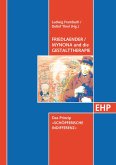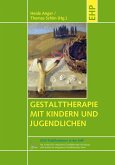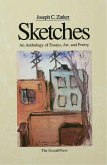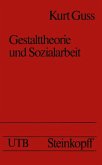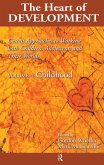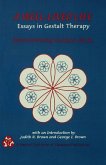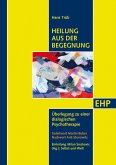Bernd BocianExpressionism Psychoanalysis Judaism
Fritz Perls in Berlin 1893 - 1933 (eBook, PDF)
Expressionism Psychoanalysis Judaism
Übersetzer: Schmitz, Philip
22,99 €
22,99 €
inkl. MwSt.
Sofort per Download lieferbar

0 °P sammeln
22,99 €
Als Download kaufen

22,99 €
inkl. MwSt.
Sofort per Download lieferbar

0 °P sammeln
Jetzt verschenken
Alle Infos zum eBook verschenken
22,99 €
inkl. MwSt.
Sofort per Download lieferbar
Alle Infos zum eBook verschenken

0 °P sammeln
Bernd BocianExpressionism Psychoanalysis Judaism
Fritz Perls in Berlin 1893 - 1933 (eBook, PDF)
Expressionism Psychoanalysis Judaism
Übersetzer: Schmitz, Philip
- Format: PDF
- Merkliste
- Auf die Merkliste
- Bewerten Bewerten
- Teilen
- Produkt teilen
- Produkterinnerung
- Produkterinnerung

Bitte loggen Sie sich zunächst in Ihr Kundenkonto ein oder registrieren Sie sich bei
bücher.de, um das eBook-Abo tolino select nutzen zu können.
Hier können Sie sich einloggen
Hier können Sie sich einloggen
Sie sind bereits eingeloggt. Klicken Sie auf 2. tolino select Abo, um fortzufahren.

Bitte loggen Sie sich zunächst in Ihr Kundenkonto ein oder registrieren Sie sich bei bücher.de, um das eBook-Abo tolino select nutzen zu können.
Using Fritz Perls as an example, this book recalls the representatives of an urban avant-garde culture who were driven out of Europe, emigrated, and for the most part found a new homeland in the USA. Many an element of the lost avant-garde spirit later found its way back to Europe in an enriched form. This monograph is the first to focus in greater depth on the German-European roots of Gestalt therapy. It thereby bridges the continents at the same time.
- Geräte: PC
- ohne Kopierschutz
- eBook Hilfe
- Größe: 1.49MB
- FamilySharing(5)
Andere Kunden interessierten sich auch für
![Friedlaender / Mynona und die Gestalttherapie (eBook, PDF) Friedlaender / Mynona und die Gestalttherapie (eBook, PDF)]() Friedlaender / Mynona und die Gestalttherapie (eBook, PDF)21,99 €
Friedlaender / Mynona und die Gestalttherapie (eBook, PDF)21,99 €![Gestalttherapie mit Kindern und Jugendlichen (eBook, PDF) Gestalttherapie mit Kindern und Jugendlichen (eBook, PDF)]() Gestalttherapie mit Kindern und Jugendlichen (eBook, PDF)23,99 €
Gestalttherapie mit Kindern und Jugendlichen (eBook, PDF)23,99 €![Sketches (eBook, PDF) Sketches (eBook, PDF)]() Joseph C. ZinkerSketches (eBook, PDF)29,95 €
Joseph C. ZinkerSketches (eBook, PDF)29,95 €- -36%11
![Gestalttheorie und Sozialarbeit (eBook, PDF) Gestalttheorie und Sozialarbeit (eBook, PDF)]() Gestalttheorie und Sozialarbeit (eBook, PDF)38,66 €
Gestalttheorie und Sozialarbeit (eBook, PDF)38,66 € ![Heart of Development, V. 1 (eBook, PDF) Heart of Development, V. 1 (eBook, PDF)]() Gordon WheelerHeart of Development, V. 1 (eBook, PDF)30,95 €
Gordon WheelerHeart of Development, V. 1 (eBook, PDF)30,95 €![A Well-Lived Life (eBook, PDF) A Well-Lived Life (eBook, PDF)]() Sylvia F. CrockerA Well-Lived Life (eBook, PDF)29,95 €
Sylvia F. CrockerA Well-Lived Life (eBook, PDF)29,95 €![Heilung aus der Begegnung (eBook, PDF) Heilung aus der Begegnung (eBook, PDF)]() Hans TrübHeilung aus der Begegnung (eBook, PDF)19,99 €
Hans TrübHeilung aus der Begegnung (eBook, PDF)19,99 €- -21%11
-
-
Using Fritz Perls as an example, this book recalls the representatives of an urban avant-garde culture who were driven out of Europe, emigrated, and for the most part found a new homeland in the USA. Many an element of the lost avant-garde spirit later found its way back to Europe in an enriched form. This monograph is the first to focus in greater depth on the German-European roots of Gestalt therapy. It thereby bridges the continents at the same time.
Dieser Download kann aus rechtlichen Gründen nur mit Rechnungsadresse in A, B, BG, CY, CZ, D, DK, EW, E, FIN, F, GR, H, IRL, I, LT, L, LR, M, NL, PL, P, R, S, SLO, SK ausgeliefert werden.
Produktdetails
- Produktdetails
- Verlag: EHP - Verlag Andreas Kohlhage
- Seitenzahl: 319
- Erscheinungstermin: 1. Juli 2015
- Englisch
- ISBN-13: 9783897976092
- Artikelnr.: 43238156
- Verlag: EHP - Verlag Andreas Kohlhage
- Seitenzahl: 319
- Erscheinungstermin: 1. Juli 2015
- Englisch
- ISBN-13: 9783897976092
- Artikelnr.: 43238156
- Herstellerkennzeichnung Die Herstellerinformationen sind derzeit nicht verfügbar.
Bernd Bocian, PH.D. was born in 1954, and lives in Genoa, Italy. He works in private practice as well as in a Cooperativa Sociale. He is gestalt therapist, and was also trained in Reichian body work and psychoanalytic therapy. From 1985 to 2000 he was a member of the editorial board of the German journal Gestalttherapie (Ed. by DVG - Deutsche Vereinigung für Gestalttherapie - German Association for Gestalt therapy). He is author of various publications on the historical and contemporary relation between gestalt therapy and psychoanalysis (e.g. Bocian, B. / Staemmler, F.-M.: Gestalttherapie und Psychoanalyse 2000).
Deutsche Vereinigung für Gestalttherapie: Greeting 11 European Association
for Gestalt Therapy: Greeting 13 Preface to the English edition 15 Preface
and Acknowledgements (from the fi rst German edition) 17 TOPICALITY AND THE
WORK OF REMEMBERING 21 I. BIOGRAPHICAL COMPONENTS 29 1. Formative Life
Contexts. War - Expressionism - Psychoanalysis 29 2. The Jewish Context and
the Educational Ideal of Classical Humanism 32 2.1 Jews in the German
Empire. Between Antisemitism and German-Jewish Cultural Chauvinism 33 2.2
Bourgeois Humanism Turns into Nationalism 37 2.3 The Humanistic Educational
Ideal. Individuality and Holistic Personality Development 41 2.3.1
Friedrich Schiller. The 'Middle Mode' and 'Living Gestalt' 42 3. Early Infl
uences 43 3.1 A Family from the Eastern Reaches of the German Empire 43 3.2
The Perls Family. 'Creeping up the Middle-Class Ladder' 46 3.3 Childhood.
Father Confl ict and Rebellion 48 3.3.1 'The Emperor has no Clothes.' 52
3.4 Experiences in School. The Subservient Mentality and Unsuccessful
Triangulation 53 3.4.1 The Winners in Modernization. Concerning the Level
of Jewish Education 53 3.4.2 Cruel Teachers and an Absent Father 57 3.5
Perls's Father. An Irregular Free Mason 61 3.5.1 'The Order of Humanists'
and the Peculiarity of Life in Nathan Perls's Lodges 62 3.5.2 Grand Master
Nathan Perls. Revisionist and Nonconformist 65 3.6 Experiences in the
Theater. The Search for Emotional Truth 66 3.6.1 A Mother Who Loved Art 67
3.6.2 Max Reinhardt 67 3.6.3 Perls the Actor. Revealing False Poses 70 3.7
Sexuality. Freud and Kohut 73 3.7.1 Sexual Need and Hunger for Life 73
3.7.2 Perls's 'Sexual Problem' and Self Psychology 75 3.8 Medical Studies
78 4. War, Trauma, and Revolution 80 4.1 War and the Cultural Avant-Garde
82 4.2 Working for the Red Cross and the Initial Shock of War 85 4.3 The
Front Line, Gas Warfare, Death. Field Theory as an Experience 87 4.4 The
'Jewish Census' and the German-Jewish Patriots 91 4.5 Bohemian Berlin.
Injury and Opposition 94 4.6 The Trauma of War 96 4.7 Revolution and Murder
Continue 100 4.7.1 The Civil War of 1918/1919 in Berlin 102 4.7.2 Rosa
Luxemburg and Karl Liebknecht are Murdered. The Bohemian Scene Radicalizes
Itself 104 4.8 Perls in 'Peaceful Freiburg' and the Counter-Revolution in
Munich 106 4.9 Gustav Landauer's Liberal Socialism 109 5. The Artistic
Avant-Garde in Berlin and the Expressionist Weltanschauung 112 5.1 Perls in
the Bohemian Circle Surrounding Salomo Friedlaender/Mynona 115 5.2 Ego
Dissociation and the Renewal of Humanity 118 5.3 Hannah Höch. The
Simultaneity of Perception. Constructivism 121 5.4 A Precious Figure
against a Nihilistic Ground 122 5.5 Friedlaender/Mynona's Approach.
Nietzsche, Polarism, the Middle Point 123 5.6 The Dadaistic Revolt and the
Gestalt Dada 128 5.6.1 Fritz Perls - 'Gestalt Dada' 131 5.7 Raoul Hausmann.
"Philosopher of Dada' and Polarity Theoretician 134 5.8 Otto Gross.
Anarchism and Psychoanalysis 136 5.8.1 Gross and Hausmann. Revolting
against One's Own Conventions 138 5.8.2 Cultural-Revolutionary
Psychoanalysis. One's Own Authority as Opposed to the Authority of the
Other 140 5.8.3 The Need for Contact. Loneliness or Submission 142 6. The
Years of the Weimar Republic 145 6.1 The Early Crisis Years. Anti-Semitism
and Infl ation 145 6.2 The 'Golden Twenties.' Americanism and the Coldness
Metaphor 148 6.3 Psychoanalysis. Initial Contacts 153 6.3.1 Sigmund Freud
as the Saviour 153 6.3.2 Karen Horney. Human Involvement and Hopes of
Growth 157 6.4 Frankfurt. The Gestalt Concept or, Thinking in Terms of
Context and Relationships 160 6.4.1 Goldstein, Lewin and the Unconscious
161 6.4.2 An Integrative Atmosphere 164 6.4.3 Psychoanalysis and Gestalt
Psychology 166 6.5 Intermezzo at the Vienna Psychoanalytic Institute 169
6.5.1 Attending Wilhelm Reich's 'Technical Seminar.' Resistance and
Character Analysis 173 6.5.2 Orgasm and the Genital Character 178 6.6 A New
Beginning in Berlin. Medicine and Psychoanalysis 180 6.6.1 Working as a
Physician 180 6. 6.2 Learning and Suff ering at the Psychoanalytic
Institute 182 6.7 The Bauhaus Concept 186 6.8 Political Polarization,
Dialectics, and Alienation 189 6.8.1 Perls Attempts to Take a Class
Position 191 6.8.2 Georg Lukács. Hegel, Dialectics and the Contextual
Method 194 7. The Concept of Totality 198 7.1 Totality on the Left and on
the Right 198 7.2 The Transitional Gestalt and the Figure of Tension 199
7.3 The Individualism of Lebensphilosophie 201 8. At the Berlin
Psychoanalytic Institute. 1930-1933 204 8.1 Siegfried Bernfeld. The Gestalt
Experience and 'Social Place' 206 8.2 Wilhelm Reich. Politics and the
Continuing Development of Active Technique 208 8.2.1 Neocatharsis and
Physical Resistance. From Ferenczi to Fenichel and Reich 210 8.2.2
Masochism and Politics. Bernfeld and Freud against Reich 213 9. Hunger,
Chewing, Growing. Intellectual Approaches of One's Own in Opposition to the
Power of Psychoanalytic Interpretation and the German Tradition of
Obedience 215 9.1 Ernst Bloch. The Hunger Drive, Self-Extension, and the
Dawning of the New 217 10. Trauma Therapy and Figures of Steel 220 10.1 The
Trauma of War and 'Acting Out' Therapy 221 10.2 Armored Men. Men of Steel
225 11. Perls's Lessons from the End of the Weimar Republic 229 11.1 Dr.
Perls and the 'Marxist Workers' School' (MASCH) 230 11.2 Left Freudians 231
11.3 Splitting instead of Integration. The Failure of the 'Anti-Fascist
Action' 235 11.4 The Marginalization of Wilhelm Reich 237 11.5 Endangerment
and Escape 240 11.5.1 Confl uence and Projections Can Cost Lives 244 12.
Exodus and Death 246 12.1 The Fate of the Perls Family in Berlin 248 II.
THE EXPERIENCES OF THE GERMAN-JEWISH AVANT-GARDE. THEIR TOPICALITY TODAY
249 1. German-Jewish Experiences 249 1.1 Kafka's Four-Legged Beings 250 1.2
Universalism, Loneliness, Modernity 251 1.3 Gestalt Assimilation Theory. A
Biological-Sociological Resistance Metaphor 253 2. Autonomy instead of
Auschwitz: Confl uence Kills 255 3. Perls's Topicality: Identity Work 259
3.1 Nietzsche and the Artists 260 3.2 The Multiplicity of the Subject 262
3.3 Kafka and Perls. 'But' versus 'And' 263 4. Mephistopheles As a Ferment
for Integration. Perls's Leitmotiv 264 4.1 There Is No End to Integration
264 4.2 Mephistopheles. Disturbing and Complementing 266 5. Conclusion.
Expressionists, Émigrés, and Those in Search of a Homeland 267 Annotations
269 APPENDIX 295 Institutions and archives consulted 295 References 295
Index 312
for Gestalt Therapy: Greeting 13 Preface to the English edition 15 Preface
and Acknowledgements (from the fi rst German edition) 17 TOPICALITY AND THE
WORK OF REMEMBERING 21 I. BIOGRAPHICAL COMPONENTS 29 1. Formative Life
Contexts. War - Expressionism - Psychoanalysis 29 2. The Jewish Context and
the Educational Ideal of Classical Humanism 32 2.1 Jews in the German
Empire. Between Antisemitism and German-Jewish Cultural Chauvinism 33 2.2
Bourgeois Humanism Turns into Nationalism 37 2.3 The Humanistic Educational
Ideal. Individuality and Holistic Personality Development 41 2.3.1
Friedrich Schiller. The 'Middle Mode' and 'Living Gestalt' 42 3. Early Infl
uences 43 3.1 A Family from the Eastern Reaches of the German Empire 43 3.2
The Perls Family. 'Creeping up the Middle-Class Ladder' 46 3.3 Childhood.
Father Confl ict and Rebellion 48 3.3.1 'The Emperor has no Clothes.' 52
3.4 Experiences in School. The Subservient Mentality and Unsuccessful
Triangulation 53 3.4.1 The Winners in Modernization. Concerning the Level
of Jewish Education 53 3.4.2 Cruel Teachers and an Absent Father 57 3.5
Perls's Father. An Irregular Free Mason 61 3.5.1 'The Order of Humanists'
and the Peculiarity of Life in Nathan Perls's Lodges 62 3.5.2 Grand Master
Nathan Perls. Revisionist and Nonconformist 65 3.6 Experiences in the
Theater. The Search for Emotional Truth 66 3.6.1 A Mother Who Loved Art 67
3.6.2 Max Reinhardt 67 3.6.3 Perls the Actor. Revealing False Poses 70 3.7
Sexuality. Freud and Kohut 73 3.7.1 Sexual Need and Hunger for Life 73
3.7.2 Perls's 'Sexual Problem' and Self Psychology 75 3.8 Medical Studies
78 4. War, Trauma, and Revolution 80 4.1 War and the Cultural Avant-Garde
82 4.2 Working for the Red Cross and the Initial Shock of War 85 4.3 The
Front Line, Gas Warfare, Death. Field Theory as an Experience 87 4.4 The
'Jewish Census' and the German-Jewish Patriots 91 4.5 Bohemian Berlin.
Injury and Opposition 94 4.6 The Trauma of War 96 4.7 Revolution and Murder
Continue 100 4.7.1 The Civil War of 1918/1919 in Berlin 102 4.7.2 Rosa
Luxemburg and Karl Liebknecht are Murdered. The Bohemian Scene Radicalizes
Itself 104 4.8 Perls in 'Peaceful Freiburg' and the Counter-Revolution in
Munich 106 4.9 Gustav Landauer's Liberal Socialism 109 5. The Artistic
Avant-Garde in Berlin and the Expressionist Weltanschauung 112 5.1 Perls in
the Bohemian Circle Surrounding Salomo Friedlaender/Mynona 115 5.2 Ego
Dissociation and the Renewal of Humanity 118 5.3 Hannah Höch. The
Simultaneity of Perception. Constructivism 121 5.4 A Precious Figure
against a Nihilistic Ground 122 5.5 Friedlaender/Mynona's Approach.
Nietzsche, Polarism, the Middle Point 123 5.6 The Dadaistic Revolt and the
Gestalt Dada 128 5.6.1 Fritz Perls - 'Gestalt Dada' 131 5.7 Raoul Hausmann.
"Philosopher of Dada' and Polarity Theoretician 134 5.8 Otto Gross.
Anarchism and Psychoanalysis 136 5.8.1 Gross and Hausmann. Revolting
against One's Own Conventions 138 5.8.2 Cultural-Revolutionary
Psychoanalysis. One's Own Authority as Opposed to the Authority of the
Other 140 5.8.3 The Need for Contact. Loneliness or Submission 142 6. The
Years of the Weimar Republic 145 6.1 The Early Crisis Years. Anti-Semitism
and Infl ation 145 6.2 The 'Golden Twenties.' Americanism and the Coldness
Metaphor 148 6.3 Psychoanalysis. Initial Contacts 153 6.3.1 Sigmund Freud
as the Saviour 153 6.3.2 Karen Horney. Human Involvement and Hopes of
Growth 157 6.4 Frankfurt. The Gestalt Concept or, Thinking in Terms of
Context and Relationships 160 6.4.1 Goldstein, Lewin and the Unconscious
161 6.4.2 An Integrative Atmosphere 164 6.4.3 Psychoanalysis and Gestalt
Psychology 166 6.5 Intermezzo at the Vienna Psychoanalytic Institute 169
6.5.1 Attending Wilhelm Reich's 'Technical Seminar.' Resistance and
Character Analysis 173 6.5.2 Orgasm and the Genital Character 178 6.6 A New
Beginning in Berlin. Medicine and Psychoanalysis 180 6.6.1 Working as a
Physician 180 6. 6.2 Learning and Suff ering at the Psychoanalytic
Institute 182 6.7 The Bauhaus Concept 186 6.8 Political Polarization,
Dialectics, and Alienation 189 6.8.1 Perls Attempts to Take a Class
Position 191 6.8.2 Georg Lukács. Hegel, Dialectics and the Contextual
Method 194 7. The Concept of Totality 198 7.1 Totality on the Left and on
the Right 198 7.2 The Transitional Gestalt and the Figure of Tension 199
7.3 The Individualism of Lebensphilosophie 201 8. At the Berlin
Psychoanalytic Institute. 1930-1933 204 8.1 Siegfried Bernfeld. The Gestalt
Experience and 'Social Place' 206 8.2 Wilhelm Reich. Politics and the
Continuing Development of Active Technique 208 8.2.1 Neocatharsis and
Physical Resistance. From Ferenczi to Fenichel and Reich 210 8.2.2
Masochism and Politics. Bernfeld and Freud against Reich 213 9. Hunger,
Chewing, Growing. Intellectual Approaches of One's Own in Opposition to the
Power of Psychoanalytic Interpretation and the German Tradition of
Obedience 215 9.1 Ernst Bloch. The Hunger Drive, Self-Extension, and the
Dawning of the New 217 10. Trauma Therapy and Figures of Steel 220 10.1 The
Trauma of War and 'Acting Out' Therapy 221 10.2 Armored Men. Men of Steel
225 11. Perls's Lessons from the End of the Weimar Republic 229 11.1 Dr.
Perls and the 'Marxist Workers' School' (MASCH) 230 11.2 Left Freudians 231
11.3 Splitting instead of Integration. The Failure of the 'Anti-Fascist
Action' 235 11.4 The Marginalization of Wilhelm Reich 237 11.5 Endangerment
and Escape 240 11.5.1 Confl uence and Projections Can Cost Lives 244 12.
Exodus and Death 246 12.1 The Fate of the Perls Family in Berlin 248 II.
THE EXPERIENCES OF THE GERMAN-JEWISH AVANT-GARDE. THEIR TOPICALITY TODAY
249 1. German-Jewish Experiences 249 1.1 Kafka's Four-Legged Beings 250 1.2
Universalism, Loneliness, Modernity 251 1.3 Gestalt Assimilation Theory. A
Biological-Sociological Resistance Metaphor 253 2. Autonomy instead of
Auschwitz: Confl uence Kills 255 3. Perls's Topicality: Identity Work 259
3.1 Nietzsche and the Artists 260 3.2 The Multiplicity of the Subject 262
3.3 Kafka and Perls. 'But' versus 'And' 263 4. Mephistopheles As a Ferment
for Integration. Perls's Leitmotiv 264 4.1 There Is No End to Integration
264 4.2 Mephistopheles. Disturbing and Complementing 266 5. Conclusion.
Expressionists, Émigrés, and Those in Search of a Homeland 267 Annotations
269 APPENDIX 295 Institutions and archives consulted 295 References 295
Index 312
Deutsche Vereinigung für Gestalttherapie: Greeting 11 European Association
for Gestalt Therapy: Greeting 13 Preface to the English edition 15 Preface
and Acknowledgements (from the fi rst German edition) 17 TOPICALITY AND THE
WORK OF REMEMBERING 21 I. BIOGRAPHICAL COMPONENTS 29 1. Formative Life
Contexts. War - Expressionism - Psychoanalysis 29 2. The Jewish Context and
the Educational Ideal of Classical Humanism 32 2.1 Jews in the German
Empire. Between Antisemitism and German-Jewish Cultural Chauvinism 33 2.2
Bourgeois Humanism Turns into Nationalism 37 2.3 The Humanistic Educational
Ideal. Individuality and Holistic Personality Development 41 2.3.1
Friedrich Schiller. The 'Middle Mode' and 'Living Gestalt' 42 3. Early Infl
uences 43 3.1 A Family from the Eastern Reaches of the German Empire 43 3.2
The Perls Family. 'Creeping up the Middle-Class Ladder' 46 3.3 Childhood.
Father Confl ict and Rebellion 48 3.3.1 'The Emperor has no Clothes.' 52
3.4 Experiences in School. The Subservient Mentality and Unsuccessful
Triangulation 53 3.4.1 The Winners in Modernization. Concerning the Level
of Jewish Education 53 3.4.2 Cruel Teachers and an Absent Father 57 3.5
Perls's Father. An Irregular Free Mason 61 3.5.1 'The Order of Humanists'
and the Peculiarity of Life in Nathan Perls's Lodges 62 3.5.2 Grand Master
Nathan Perls. Revisionist and Nonconformist 65 3.6 Experiences in the
Theater. The Search for Emotional Truth 66 3.6.1 A Mother Who Loved Art 67
3.6.2 Max Reinhardt 67 3.6.3 Perls the Actor. Revealing False Poses 70 3.7
Sexuality. Freud and Kohut 73 3.7.1 Sexual Need and Hunger for Life 73
3.7.2 Perls's 'Sexual Problem' and Self Psychology 75 3.8 Medical Studies
78 4. War, Trauma, and Revolution 80 4.1 War and the Cultural Avant-Garde
82 4.2 Working for the Red Cross and the Initial Shock of War 85 4.3 The
Front Line, Gas Warfare, Death. Field Theory as an Experience 87 4.4 The
'Jewish Census' and the German-Jewish Patriots 91 4.5 Bohemian Berlin.
Injury and Opposition 94 4.6 The Trauma of War 96 4.7 Revolution and Murder
Continue 100 4.7.1 The Civil War of 1918/1919 in Berlin 102 4.7.2 Rosa
Luxemburg and Karl Liebknecht are Murdered. The Bohemian Scene Radicalizes
Itself 104 4.8 Perls in 'Peaceful Freiburg' and the Counter-Revolution in
Munich 106 4.9 Gustav Landauer's Liberal Socialism 109 5. The Artistic
Avant-Garde in Berlin and the Expressionist Weltanschauung 112 5.1 Perls in
the Bohemian Circle Surrounding Salomo Friedlaender/Mynona 115 5.2 Ego
Dissociation and the Renewal of Humanity 118 5.3 Hannah Höch. The
Simultaneity of Perception. Constructivism 121 5.4 A Precious Figure
against a Nihilistic Ground 122 5.5 Friedlaender/Mynona's Approach.
Nietzsche, Polarism, the Middle Point 123 5.6 The Dadaistic Revolt and the
Gestalt Dada 128 5.6.1 Fritz Perls - 'Gestalt Dada' 131 5.7 Raoul Hausmann.
"Philosopher of Dada' and Polarity Theoretician 134 5.8 Otto Gross.
Anarchism and Psychoanalysis 136 5.8.1 Gross and Hausmann. Revolting
against One's Own Conventions 138 5.8.2 Cultural-Revolutionary
Psychoanalysis. One's Own Authority as Opposed to the Authority of the
Other 140 5.8.3 The Need for Contact. Loneliness or Submission 142 6. The
Years of the Weimar Republic 145 6.1 The Early Crisis Years. Anti-Semitism
and Infl ation 145 6.2 The 'Golden Twenties.' Americanism and the Coldness
Metaphor 148 6.3 Psychoanalysis. Initial Contacts 153 6.3.1 Sigmund Freud
as the Saviour 153 6.3.2 Karen Horney. Human Involvement and Hopes of
Growth 157 6.4 Frankfurt. The Gestalt Concept or, Thinking in Terms of
Context and Relationships 160 6.4.1 Goldstein, Lewin and the Unconscious
161 6.4.2 An Integrative Atmosphere 164 6.4.3 Psychoanalysis and Gestalt
Psychology 166 6.5 Intermezzo at the Vienna Psychoanalytic Institute 169
6.5.1 Attending Wilhelm Reich's 'Technical Seminar.' Resistance and
Character Analysis 173 6.5.2 Orgasm and the Genital Character 178 6.6 A New
Beginning in Berlin. Medicine and Psychoanalysis 180 6.6.1 Working as a
Physician 180 6. 6.2 Learning and Suff ering at the Psychoanalytic
Institute 182 6.7 The Bauhaus Concept 186 6.8 Political Polarization,
Dialectics, and Alienation 189 6.8.1 Perls Attempts to Take a Class
Position 191 6.8.2 Georg Lukács. Hegel, Dialectics and the Contextual
Method 194 7. The Concept of Totality 198 7.1 Totality on the Left and on
the Right 198 7.2 The Transitional Gestalt and the Figure of Tension 199
7.3 The Individualism of Lebensphilosophie 201 8. At the Berlin
Psychoanalytic Institute. 1930-1933 204 8.1 Siegfried Bernfeld. The Gestalt
Experience and 'Social Place' 206 8.2 Wilhelm Reich. Politics and the
Continuing Development of Active Technique 208 8.2.1 Neocatharsis and
Physical Resistance. From Ferenczi to Fenichel and Reich 210 8.2.2
Masochism and Politics. Bernfeld and Freud against Reich 213 9. Hunger,
Chewing, Growing. Intellectual Approaches of One's Own in Opposition to the
Power of Psychoanalytic Interpretation and the German Tradition of
Obedience 215 9.1 Ernst Bloch. The Hunger Drive, Self-Extension, and the
Dawning of the New 217 10. Trauma Therapy and Figures of Steel 220 10.1 The
Trauma of War and 'Acting Out' Therapy 221 10.2 Armored Men. Men of Steel
225 11. Perls's Lessons from the End of the Weimar Republic 229 11.1 Dr.
Perls and the 'Marxist Workers' School' (MASCH) 230 11.2 Left Freudians 231
11.3 Splitting instead of Integration. The Failure of the 'Anti-Fascist
Action' 235 11.4 The Marginalization of Wilhelm Reich 237 11.5 Endangerment
and Escape 240 11.5.1 Confl uence and Projections Can Cost Lives 244 12.
Exodus and Death 246 12.1 The Fate of the Perls Family in Berlin 248 II.
THE EXPERIENCES OF THE GERMAN-JEWISH AVANT-GARDE. THEIR TOPICALITY TODAY
249 1. German-Jewish Experiences 249 1.1 Kafka's Four-Legged Beings 250 1.2
Universalism, Loneliness, Modernity 251 1.3 Gestalt Assimilation Theory. A
Biological-Sociological Resistance Metaphor 253 2. Autonomy instead of
Auschwitz: Confl uence Kills 255 3. Perls's Topicality: Identity Work 259
3.1 Nietzsche and the Artists 260 3.2 The Multiplicity of the Subject 262
3.3 Kafka and Perls. 'But' versus 'And' 263 4. Mephistopheles As a Ferment
for Integration. Perls's Leitmotiv 264 4.1 There Is No End to Integration
264 4.2 Mephistopheles. Disturbing and Complementing 266 5. Conclusion.
Expressionists, Émigrés, and Those in Search of a Homeland 267 Annotations
269 APPENDIX 295 Institutions and archives consulted 295 References 295
Index 312
for Gestalt Therapy: Greeting 13 Preface to the English edition 15 Preface
and Acknowledgements (from the fi rst German edition) 17 TOPICALITY AND THE
WORK OF REMEMBERING 21 I. BIOGRAPHICAL COMPONENTS 29 1. Formative Life
Contexts. War - Expressionism - Psychoanalysis 29 2. The Jewish Context and
the Educational Ideal of Classical Humanism 32 2.1 Jews in the German
Empire. Between Antisemitism and German-Jewish Cultural Chauvinism 33 2.2
Bourgeois Humanism Turns into Nationalism 37 2.3 The Humanistic Educational
Ideal. Individuality and Holistic Personality Development 41 2.3.1
Friedrich Schiller. The 'Middle Mode' and 'Living Gestalt' 42 3. Early Infl
uences 43 3.1 A Family from the Eastern Reaches of the German Empire 43 3.2
The Perls Family. 'Creeping up the Middle-Class Ladder' 46 3.3 Childhood.
Father Confl ict and Rebellion 48 3.3.1 'The Emperor has no Clothes.' 52
3.4 Experiences in School. The Subservient Mentality and Unsuccessful
Triangulation 53 3.4.1 The Winners in Modernization. Concerning the Level
of Jewish Education 53 3.4.2 Cruel Teachers and an Absent Father 57 3.5
Perls's Father. An Irregular Free Mason 61 3.5.1 'The Order of Humanists'
and the Peculiarity of Life in Nathan Perls's Lodges 62 3.5.2 Grand Master
Nathan Perls. Revisionist and Nonconformist 65 3.6 Experiences in the
Theater. The Search for Emotional Truth 66 3.6.1 A Mother Who Loved Art 67
3.6.2 Max Reinhardt 67 3.6.3 Perls the Actor. Revealing False Poses 70 3.7
Sexuality. Freud and Kohut 73 3.7.1 Sexual Need and Hunger for Life 73
3.7.2 Perls's 'Sexual Problem' and Self Psychology 75 3.8 Medical Studies
78 4. War, Trauma, and Revolution 80 4.1 War and the Cultural Avant-Garde
82 4.2 Working for the Red Cross and the Initial Shock of War 85 4.3 The
Front Line, Gas Warfare, Death. Field Theory as an Experience 87 4.4 The
'Jewish Census' and the German-Jewish Patriots 91 4.5 Bohemian Berlin.
Injury and Opposition 94 4.6 The Trauma of War 96 4.7 Revolution and Murder
Continue 100 4.7.1 The Civil War of 1918/1919 in Berlin 102 4.7.2 Rosa
Luxemburg and Karl Liebknecht are Murdered. The Bohemian Scene Radicalizes
Itself 104 4.8 Perls in 'Peaceful Freiburg' and the Counter-Revolution in
Munich 106 4.9 Gustav Landauer's Liberal Socialism 109 5. The Artistic
Avant-Garde in Berlin and the Expressionist Weltanschauung 112 5.1 Perls in
the Bohemian Circle Surrounding Salomo Friedlaender/Mynona 115 5.2 Ego
Dissociation and the Renewal of Humanity 118 5.3 Hannah Höch. The
Simultaneity of Perception. Constructivism 121 5.4 A Precious Figure
against a Nihilistic Ground 122 5.5 Friedlaender/Mynona's Approach.
Nietzsche, Polarism, the Middle Point 123 5.6 The Dadaistic Revolt and the
Gestalt Dada 128 5.6.1 Fritz Perls - 'Gestalt Dada' 131 5.7 Raoul Hausmann.
"Philosopher of Dada' and Polarity Theoretician 134 5.8 Otto Gross.
Anarchism and Psychoanalysis 136 5.8.1 Gross and Hausmann. Revolting
against One's Own Conventions 138 5.8.2 Cultural-Revolutionary
Psychoanalysis. One's Own Authority as Opposed to the Authority of the
Other 140 5.8.3 The Need for Contact. Loneliness or Submission 142 6. The
Years of the Weimar Republic 145 6.1 The Early Crisis Years. Anti-Semitism
and Infl ation 145 6.2 The 'Golden Twenties.' Americanism and the Coldness
Metaphor 148 6.3 Psychoanalysis. Initial Contacts 153 6.3.1 Sigmund Freud
as the Saviour 153 6.3.2 Karen Horney. Human Involvement and Hopes of
Growth 157 6.4 Frankfurt. The Gestalt Concept or, Thinking in Terms of
Context and Relationships 160 6.4.1 Goldstein, Lewin and the Unconscious
161 6.4.2 An Integrative Atmosphere 164 6.4.3 Psychoanalysis and Gestalt
Psychology 166 6.5 Intermezzo at the Vienna Psychoanalytic Institute 169
6.5.1 Attending Wilhelm Reich's 'Technical Seminar.' Resistance and
Character Analysis 173 6.5.2 Orgasm and the Genital Character 178 6.6 A New
Beginning in Berlin. Medicine and Psychoanalysis 180 6.6.1 Working as a
Physician 180 6. 6.2 Learning and Suff ering at the Psychoanalytic
Institute 182 6.7 The Bauhaus Concept 186 6.8 Political Polarization,
Dialectics, and Alienation 189 6.8.1 Perls Attempts to Take a Class
Position 191 6.8.2 Georg Lukács. Hegel, Dialectics and the Contextual
Method 194 7. The Concept of Totality 198 7.1 Totality on the Left and on
the Right 198 7.2 The Transitional Gestalt and the Figure of Tension 199
7.3 The Individualism of Lebensphilosophie 201 8. At the Berlin
Psychoanalytic Institute. 1930-1933 204 8.1 Siegfried Bernfeld. The Gestalt
Experience and 'Social Place' 206 8.2 Wilhelm Reich. Politics and the
Continuing Development of Active Technique 208 8.2.1 Neocatharsis and
Physical Resistance. From Ferenczi to Fenichel and Reich 210 8.2.2
Masochism and Politics. Bernfeld and Freud against Reich 213 9. Hunger,
Chewing, Growing. Intellectual Approaches of One's Own in Opposition to the
Power of Psychoanalytic Interpretation and the German Tradition of
Obedience 215 9.1 Ernst Bloch. The Hunger Drive, Self-Extension, and the
Dawning of the New 217 10. Trauma Therapy and Figures of Steel 220 10.1 The
Trauma of War and 'Acting Out' Therapy 221 10.2 Armored Men. Men of Steel
225 11. Perls's Lessons from the End of the Weimar Republic 229 11.1 Dr.
Perls and the 'Marxist Workers' School' (MASCH) 230 11.2 Left Freudians 231
11.3 Splitting instead of Integration. The Failure of the 'Anti-Fascist
Action' 235 11.4 The Marginalization of Wilhelm Reich 237 11.5 Endangerment
and Escape 240 11.5.1 Confl uence and Projections Can Cost Lives 244 12.
Exodus and Death 246 12.1 The Fate of the Perls Family in Berlin 248 II.
THE EXPERIENCES OF THE GERMAN-JEWISH AVANT-GARDE. THEIR TOPICALITY TODAY
249 1. German-Jewish Experiences 249 1.1 Kafka's Four-Legged Beings 250 1.2
Universalism, Loneliness, Modernity 251 1.3 Gestalt Assimilation Theory. A
Biological-Sociological Resistance Metaphor 253 2. Autonomy instead of
Auschwitz: Confl uence Kills 255 3. Perls's Topicality: Identity Work 259
3.1 Nietzsche and the Artists 260 3.2 The Multiplicity of the Subject 262
3.3 Kafka and Perls. 'But' versus 'And' 263 4. Mephistopheles As a Ferment
for Integration. Perls's Leitmotiv 264 4.1 There Is No End to Integration
264 4.2 Mephistopheles. Disturbing and Complementing 266 5. Conclusion.
Expressionists, Émigrés, and Those in Search of a Homeland 267 Annotations
269 APPENDIX 295 Institutions and archives consulted 295 References 295
Index 312

